
Astragalus asymmetricus is a species of milkvetch known by the common name San Joaquin milkvetch. It is endemic to California, where it grows in grassy and disturbed areas in the Central Valley and nearby parts of the Central Coast Ranges and San Francisco Bay Area.
Astragalus austiniae is a species of milkvetch known by the common name Austin's milkvetch. It is native to the Sierra Nevada of California and Nevada in the vicinity of Lake Tahoe. It is a plant of the alpine climate of the high mountains, where it tolerates exposed areas.

Astragalus bolanderi is a species of milkvetch known by the common name Bolander's milkvetch. It is native to western Nevada and parts of the Sierra Nevada in California. It grows in dry, rocky habitat on mountain and plateau.

Astragalus congdonii is a species of milkvetch known by the common name Congdon's milkvetch. It is a perennial herb that is endemic to central California.
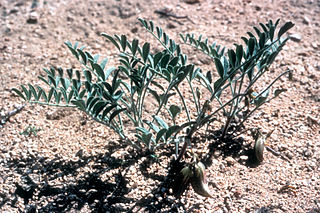
Astragalus ertterae is a rare species of milkvetch known by the common name Walker Pass milkvetch. It is endemic to California, where it is known from only three occurrences near Walker Pass in the Sierra Nevada. It is endangered by trampling, trail use, and also grazing.
Astragalus funereus is an uncommon species of milkvetch known by the common names Funeral Mountain milkvetch and black milkvetch.

Astragalus gambelianus is a species of milkvetch known by the common name Gambel's dwarf milkvetch. It is native to California, with its distribution extending into Oregon to the north and Baja California to the south.
Astragalus gilmanii is a species of milkvetch known by the common name Gilman's milkvetch. It is native to the desert scrub and woodland of Nevada, the California Sierra Nevada and Inyo Mountains, and it is known from a few locations in the Panamint Range adjacent to Death Valley in California.
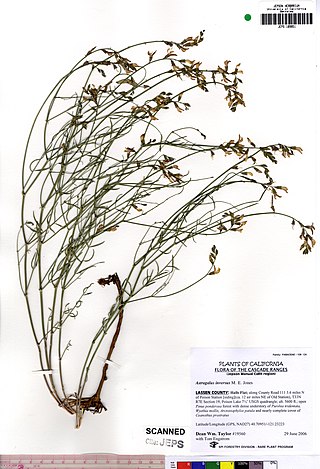
Astragalus inversus is a species of milkvetch known by the common name Susanville milkvetch.
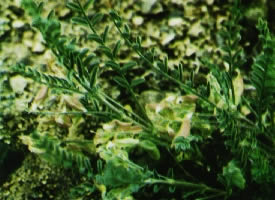
Astragalus johannis-howellii is a species of milkvetch known by the common name Long Valley milkvetch. It is native to eastern California, including Long Valley in Mono County, and its distribution extends over the border into Nevada. It is a plant of the Great Basin's scrub habitat.
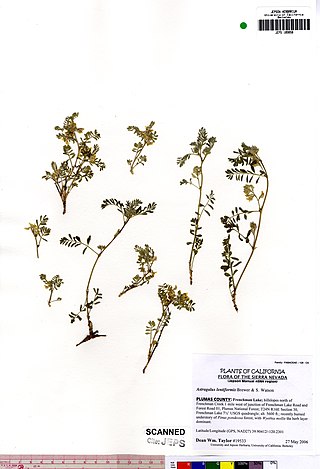
Astragalus lentiformis is a species of milkvetch known by the common name lens-pod milkvetch. It is endemic to the Sierra Nevada in eastern Plumas County, California, where it grows in chaparral scrub and coniferous forests.
Astragalus miguelensis is a rare species of milkvetch known by the common name San Miguel milkvetch. It is endemic to five of the eight Channel Islands of California.
Astragalus monoensis is a rare species of milkvetch known by the common name Mono milkvetch. It is endemic to the open pumice plains of central Mono County, California.
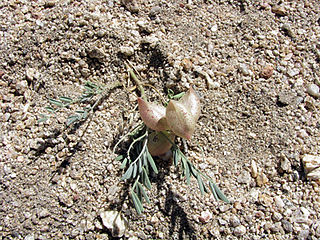
Astragalus nutans is a species of milkvetch known by the common name Providence Mountains milkvetch.

Astragalus oxyphysus is a species of milkvetch known by the common name Diablo milkvetch. It is endemic to central California, where it grows in dry grassland and scrub habitat in the Central Valley and the adjacent Inner Coast Ranges and Sierra Nevada foothills.
Astragalus panamintensis is a species of milkvetch known by the common name Panamint milkvetch.

Astragalus shevockii is a rare species of milkvetch known by the common names Little Kern milkvetch and Shevock's milkvetch. It is endemic to Tulare County, California, where it grows in the High Sierra, generally on granite-based soils in Jeffrey pine forests.
Astragalus subvestitus is a species of milkvetch known by the common name Kern County milkvetch.
Astragalus traskiae is a rare species of milkvetch known by the common name Trask's milkvetch. It is endemic to the southern Channel Islands of California, where it is known only from Santa Barbara Island and San Nicolas Island.

Astragalus desereticus is a rare species of milkvetch known by the common name Deseret milkvetch. It is endemic to Utah County, Utah, where it is known from only one population. It was thought to be extinct until 1981 when this population was discovered. The population contains 5,000 to 10,000 plants on an area of land covering less than 300 acres. It is vulnerable to damage from grazing cattle, which eat the plant and trample the soil, and from development and erosion. This is a federally listed threatened species.













